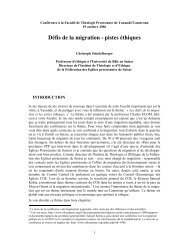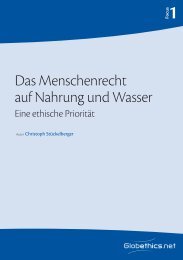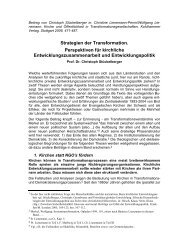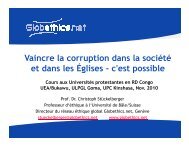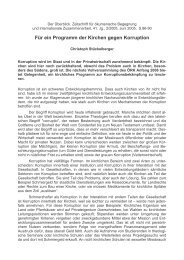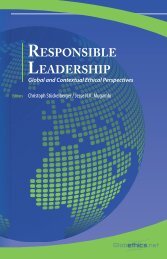BREAK THE CHAINS OF OPPRESION AND THE YOKE OF ...
BREAK THE CHAINS OF OPPRESION AND THE YOKE OF ...
BREAK THE CHAINS OF OPPRESION AND THE YOKE OF ...
Create successful ePaper yourself
Turn your PDF publications into a flip-book with our unique Google optimized e-Paper software.
HopE<br />
The universal approach towards history is strongly fostered at the 4th Assembly<br />
of the World Council of Churches in Uppsala in 1968. ‘’Uppsala set the unity<br />
and catholicity of the church squarely within the sphere of God's activity in history.<br />
Stating that ‘the church is bold in speaking of itself as the sign of the coming<br />
unity of mankind’, the assembly admitted that secular ‘instruments of conciliation<br />
and unification... often seem more effective than the church itself’.<br />
Therefore, “churches need a new openness to the world in it's aspirations, it's<br />
achievements, it's restlessness and its despair. All church structures from local to<br />
world level, must be examined to see whether they enable the church and it's<br />
members to be in mission. More dialogue with the world and more effective<br />
proclamation to the good news are equally needed. For the first time the idea of<br />
‘a genuinely universal council’, able to speak for all Christians, was articulated’’. 6<br />
The view at oikumene from the perspective of the unity of mankind however leads<br />
to tensions in the field of Christology. What is the relation between the universality<br />
of salvation and the particularity of Christ? The universal aspect of Christology<br />
had been widely elaborated in Barthian theology in which was stressed that the<br />
Lordship of Jesus Christ has decisive impact not only on the church, but on the<br />
world. The world however is not aware of this reality. The church is conscious of a<br />
reality that applies also for the world. This view is in danger to lead to an uncritical<br />
view at ecclesiology. It is also not clear how the universality of salvation is related<br />
to the particularity of Jesus Christ. It seems that the Christological language<br />
that is used, becomes more and more empty. In other words: Christology is in<br />
danger of becoming merely an ideology to maintain a universal view at history. 7 At<br />
the same time however the concept of oikumene also becomes blurred. Konrad<br />
Raiser even speaks of 'transnationale Ökumene' (transnational oikumene) which<br />
means the economical, military and political system. 8<br />
Finally the universal Christological approach is linked with a vision in which the<br />
project of Western modernisation and secularization are regarded as universal<br />
civilization. After all the renewal of church and theology after the 2nd World War<br />
did not lead to ‘liberation’ of mission from the goal of civilisation. On the contrary,<br />
the Western paradigm of progress, which is at the core of Enlightenment<br />
and this universal Christological vision become almost inseparably intertwined. 9<br />
� � � � �<br />
Christ becomes a reality in actual history: the church and the Roman emperor are the<br />
visible signs of this Reign. Later on the so called Imperium Romanum was regarded as<br />
the Universal Reign of Christ. After the Roman Empire ceased, the church was seen as<br />
the Universal Reign of Christ: One God, one Christ, one pope, one church (Jürgen<br />
Moltmann, Das Kommen Gottes, Christliche Eschatologie, Gütersloh, 1995, 184, 203).<br />
6 In: Dictionary of the Ecumenical Movement, 2nd edition, 2002. WCC Publications,<br />
Geneva (http://archives.wcc-coe.org/query/Detail.aspx?ID=40916).<br />
7 Konrad Raiser, Ökumene im Übergang, München, 81.<br />
8 Ibidem, 138.<br />
�����������������������������������������<br />
� � � � � � � �������������������<br />
�<br />
60<br />
– <strong>THE</strong>OLOGY <strong>OF</strong> HOPE IN TIMES <strong>OF</strong> GLOBALIZATION –



